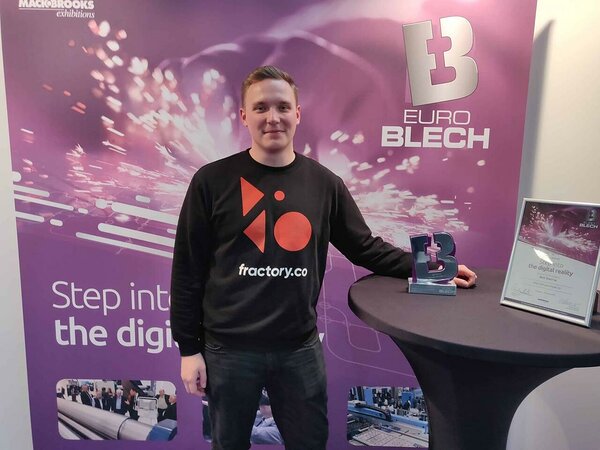United Angels VC and Trind Ventures participate in a $9 million Series A investment round to Fractory
Photo: Fractory founder Martin Vares
EstVCA members United Angels VC and Trind Ventures participate in a $9 million Series A investment round to Fractory. Founded in Estonia but now based in Manchester, England, Fractory has built a platform to make it easier for those that need to get custom metalwork to upload and order it, and for factories to pick up new customers and jobs based on those requests.
The funding is being led by OTB Ventures, a leading European investor focussed on early growth, post-product, high-tech start-ups, with existing investors Trind Ventures, Superhero Capital, United Angels VC, Startup Wise Guys and Verve Ventures also participating.
To date, the company has worked with more than 24,000 customers and hundreds of manufacturers and metal companies, and altogether it has helped crank out more than 2.5 million metal parts.
To be clear, Fractory isn’t a manufacturer itself, nor does it have no plans to get involved in that part of the process. Rather, it is in the business of enterprise software, with a marketplace for those who are able to carry out manufacturing jobs — currently in the area of metalwork — to engage with companies that need metal parts made for them, using intelligent tools to identify what needs to be made and connecting that potential job to the specialist manufacturers that can make it.
The challenge that Fractory is solving is not unlike that faced in a lot of industries that have variable supply and demand, a lot of fragmentation, and generally an inefficient way of sourcing work.
As Martin Vares, Fractory’s founder and MD, describes, companies who need metal parts made might have one factory they regularly work with. But if there are any circumstances that might mean that this factory cannot carry out a job, then the customer needs to shop around and find others to do it instead. This can be a time-consuming, and costly process.
“It’s a very fragmented market and there are so many ways to manufacture products, and the connection between those two is complicated,” he said. “In the past, if you wanted to outsource something, it would mean multiple emails to multiple places. But you can’t go to 30 different suppliers like that individually. We make it into a one-stop shop.”
--
Image credit: Fractory; Unsplash/Jakub Skafiriak
The funding is being led by OTB Ventures, a leading European investor focussed on early growth, post-product, high-tech start-ups, with existing investors Trind Ventures, Superhero Capital, United Angels VC, Startup Wise Guys and Verve Ventures also participating.
To date, the company has worked with more than 24,000 customers and hundreds of manufacturers and metal companies, and altogether it has helped crank out more than 2.5 million metal parts.
To be clear, Fractory isn’t a manufacturer itself, nor does it have no plans to get involved in that part of the process. Rather, it is in the business of enterprise software, with a marketplace for those who are able to carry out manufacturing jobs — currently in the area of metalwork — to engage with companies that need metal parts made for them, using intelligent tools to identify what needs to be made and connecting that potential job to the specialist manufacturers that can make it.
The challenge that Fractory is solving is not unlike that faced in a lot of industries that have variable supply and demand, a lot of fragmentation, and generally an inefficient way of sourcing work.
As Martin Vares, Fractory’s founder and MD, describes, companies who need metal parts made might have one factory they regularly work with. But if there are any circumstances that might mean that this factory cannot carry out a job, then the customer needs to shop around and find others to do it instead. This can be a time-consuming, and costly process.
“It’s a very fragmented market and there are so many ways to manufacture products, and the connection between those two is complicated,” he said. “In the past, if you wanted to outsource something, it would mean multiple emails to multiple places. But you can’t go to 30 different suppliers like that individually. We make it into a one-stop shop.”
- Read more on the investment on TechCrunch
- Fractory website
--
Image credit: Fractory; Unsplash/Jakub Skafiriak
